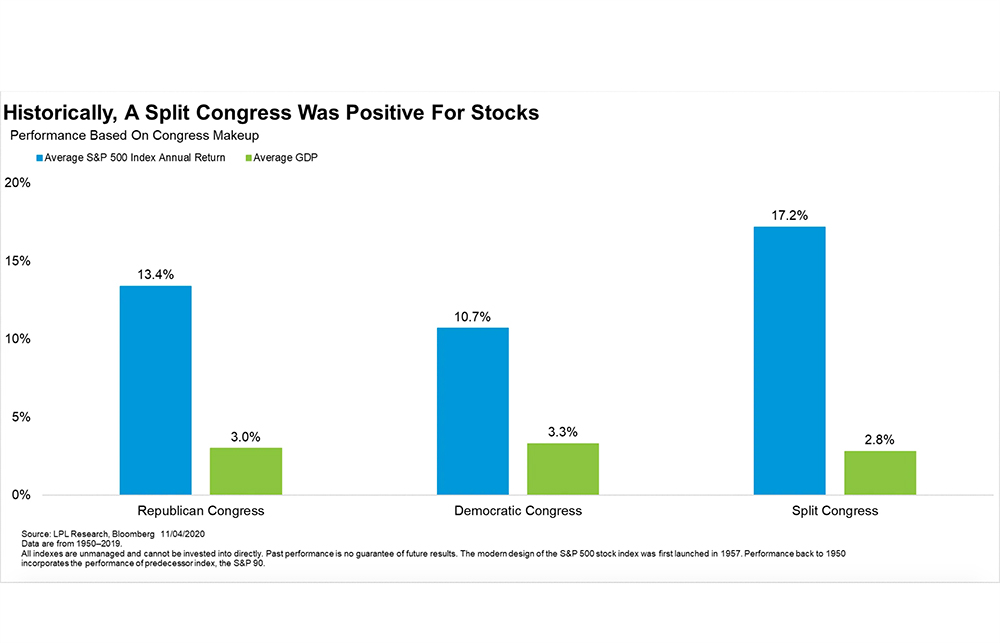当所有选票计数完毕,投资者们可能仍然对美国政治格局的前景一片迷茫。但他们知道的是,在历史上,当美国国会分裂——即一党控制参议院、另一党控制众议院时,股市会有怎样的表现。
现在,很多华尔街人都认为,共和党可以保持对参议院的控制权——但这种预期直到最近才成为一项基本共识(目前,种族问题日益紧张)。11月4日,这种国会分裂的可能性使股市飙升,其影响似乎超越了动荡不已的总统大选。
从历史上看,一个分裂的国会往往对股市有利:“在以往国会由两党控制而分裂的状况中,标普500指数的表现都不错,平均涨幅超过了17%。”11月4日,金融研究机构LPL的分析师在一份报告中写道(见下图)。“此外,在过去出现过国会分裂的年份里,股市上涨的情形已经连续出现了10次,而2020年可能是第11次。”

同样在11月4日,LPL的分析师杰夫•布赫宾德向《财富》杂志表示,国会分裂造成股市上涨的部分原因是,股票偏向于“求稳”,希望两党处于“僵持状态”,这样“一些可能引起市场动荡的重大政策就无法推行”。在2020年的背景下,如果前副总统拜登当选,国会就会分裂,不再是由一党控制,这样,出台“大幅增税”政策的风险就会降低。
布赫宾德认为,短期内,股市可能会有一些波动,直到投资者已经明确知晓选举结果为止。但是,“在政府由两党控制的分裂情况下,无论入主白宫的是特朗普还是拜登,无论他们将制定哪些对我们产生切身影响的政策,市场都应该会有时间来适应得更加轻松自如。”
投资公司Columbia Threadneedle的分析师在11月4日的一份报告中写道,在过去,美国经常会出现“分裂的政府”,而在这一状况出现的时期,会“限制一些更极端的改革建议。”他还指出:“在某些人看来,这种权力制衡是更好的结果。但鉴于新冠肺炎疫情还在继续流行,亟需通过额外的财政措施来应对由此造成的经济损失,因此在接下来的几个月,双方能够开展合作十分必要。”
分析人士说,市场仍然深受困扰,担心在分裂的国会中,两党不会合作,刺激财政的措施也就无法出台(可以对恢复经济产生一定影响的一揽子计划也无法通过)。但是到目前为止,“华尔街对大选的态度是乐观的——尽管最终结果还未出炉。这也就意味着,投资者们认为这种僵局是件好事。”研究机构CFRA的分析师萨姆•斯托瓦尔于11月4日写道。(财富中文网)
编译:陈聪聪
当所有选票计数完毕,投资者们可能仍然对美国政治格局的前景一片迷茫。但他们知道的是,在历史上,当美国国会分裂——即一党控制参议院、另一党控制众议院时,股市会有怎样的表现。
现在,很多华尔街人都认为,共和党可以保持对参议院的控制权——但这种预期直到最近才成为一项基本共识(目前,种族问题日益紧张)。11月4日,这种国会分裂的可能性使股市飙升,其影响似乎超越了动荡不已的总统大选。
从历史上看,一个分裂的国会往往对股市有利:“在以往国会由两党控制而分裂的状况中,标普500指数的表现都不错,平均涨幅超过了17%。”11月4日,金融研究机构LPL的分析师在一份报告中写道(见下图)。“此外,在过去出现过国会分裂的年份里,股市上涨的情形已经连续出现了10次,而2020年可能是第11次。”
同样在11月4日,LPL的分析师杰夫•布赫宾德向《财富》杂志表示,国会分裂造成股市上涨的部分原因是,股票偏向于“求稳”,希望两党处于“僵持状态”,这样“一些可能引起市场动荡的重大政策就无法推行”。在2020年的背景下,如果前副总统拜登当选,国会就会分裂,不再是由一党控制,这样,出台“大幅增税”政策的风险就会降低。
布赫宾德认为,短期内,股市可能会有一些波动,直到投资者已经明确知晓选举结果为止。但是,“在政府由两党控制的分裂情况下,无论入主白宫的是特朗普还是拜登,无论他们将制定哪些对我们产生切身影响的政策,市场都应该会有时间来适应得更加轻松自如。”
投资公司Columbia Threadneedle的分析师在11月4日的一份报告中写道,在过去,美国经常会出现“分裂的政府”,而在这一状况出现的时期,会“限制一些更极端的改革建议。”他还指出:“在某些人看来,这种权力制衡是更好的结果。但鉴于新冠肺炎疫情还在继续流行,亟需通过额外的财政措施来应对由此造成的经济损失,因此在接下来的几个月,双方能够开展合作十分必要。”
分析人士说,市场仍然深受困扰,担心在分裂的国会中,两党不会合作,刺激财政的措施也就无法出台(可以对恢复经济产生一定影响的一揽子计划也无法通过)。但是到目前为止,“华尔街对大选的态度是乐观的——尽管最终结果还未出炉。这也就意味着,投资者们认为这种僵局是件好事。”研究机构CFRA的分析师萨姆•斯托瓦尔于11月4日写道。(财富中文网)
编译:陈聪聪
Investors may not yet know exactly what the political landscape will look like once all the votes have been counted. But one thing they can know? How stocks historically perform under a divided Congress, where one party controls the Senate and the other controls the House.
Many on the Street now believe Republicans could maintain control of the Senate, a prospect that until recently wasn’t considered the base case scenario (currently, races are tight). On November 4, stocks soared at the possibility of a split Congress—seemingly looking beyond the tumultuous presidential contest.
Historically, a divided Congress tends to be good for stocks: “The S&P 500 historically has done quite well under a divided Congress, up more than 17% on average,” analysts at LPL Financial wrote in a note on November 4 (see chart). “Additionally, in years with a divided Congress, stocks have been higher the past 10 times, with 2020 potentially being the 11th in a row.”
The reason is due in part to the fact that stocks “tend to like gridlock and taking out major policy disruption,” LPL’s Jeff Buchbinder told Fortune on November 4. In a 2020 context, a divided Congress might lower the risk of a big tax hike if former Vice President Joe Biden were elected.
Buchbinder believes short-term there may be some volatility until investors get clarity about the election results, but “with divided government, the market should have an easier time getting comfortable with whatever policy road map we’re going to get, whether it’s Trump or Biden in the White House.”
The U.S. has frequently had a divided government in the past, and “it has had the impact of limiting some of the more extreme proposals for change over that time,” analysts at Columbia Threadneedle wrote in a note on November 4. “For some, this check on power is the preferable outcome. But given the need for additional fiscal measures to address the economic damage caused by the ongoing pandemic, an ability to work together in the coming months is essential.”
That worry over a split Congress’s ability to work together over stimulus (and pass a meaningful package) remains a headwind for markets, analysts say. But so far “Wall Street’s positive response to the yet-to-be-decided election implies that investors think gridlock is good,” wrote CFRA’s Sam Stovall on November 4.






